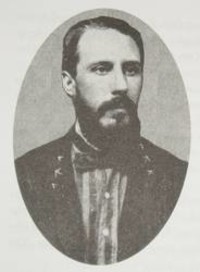Hall of Fame
Alexander, E. Porter

E. Porter Alexander was born in Washington, Georgia, on May 26, 1835. He graduated from West Point in 1856 and was commissioned in the Corps of Engineers. In 1859-60 he assisted Major A. J. Myer in the development of the wigwag battlefield communications system that led to the establishment of the u.s. Army Signal Corps.
Charles Cevor, a native of Savannah, Georgia, was a well-known aeronaut. In 1861, he offered his services and those of his balloon, "Forest City," to the Confederate Army, but his offer was not accepted at that time. In April, 1862, Brigadier General Thomas Drayton, commanding the 4th Military District of South Carolina, indicated to Captain Langdon Cheves that he wanted Cevor to construct a balloon, providing that gas and other materials could be procured. Given reports that the materials were available and that a field support system might be feasible, General Drayton authorized Captain Cheves to have Cevor continue with the construction of a balloon. They proceeded to Richmond, Virginia, with the balloon to support General Lee's defense of Richmond. Shortly after their arrival, General Lee placed Lieutenant Colonel Alexander in charge of the Confederacy's new aeronautic corps.
On June 27th, Cevor wrote to Captain Cheves to report that he and Lieutenant Colonel Alexander had been aloft in the balloon all day during the battle of Gaine's Mill, and were able to see everything that was going on and in direct signaling distance of General Lee. During the balloon operations through June 29th, the balloon was filled with gas each morning at the Richmond Gas Works, tied to a steam engine and run down the York River Railroad to a point where the battlefield could be observed. When General George McClellan changed his base to the James River and began his withdrawal from Richmond, balloon operations continued on a daily basis with the balloon being towed to the vicinity of the battlefield by the Confederate gunboat CSS Thaser.
On July 4th, the Teaser went aground on a mud bar and was captured by a Union gunboat. Cevor was commissioned a captain balloonist in the Confederate Army and became the first person commissioned as a military aviator in our history. Alexander was promoted to brigadier general in 1864 and became Chief of Artillery of Longstreet's Corps in the Army of Northern Virginia. He was regarded by many authorities as the outstanding artilleryman of the Confederacy. After the war, General Alexander served as Professor of Engineering at the University of South Carolina, President of the Columbia Oil Company, President of the Georgia Railroad and Banking Company, President of the Central Georgia Railroad, and he wrote several books about the Civil War. General Alexander died in Savannah, Georgia, in 1910 and is buried in the Magnolia Cemetery in Augusta, Georgia.
In recognition of their distinguished military contributions to aviation, Brigadier General E. Porter Alexander and Captain Charles Cevor were enshrined into the Georgia Aviation Hall of Fame on April 29, 2006.
